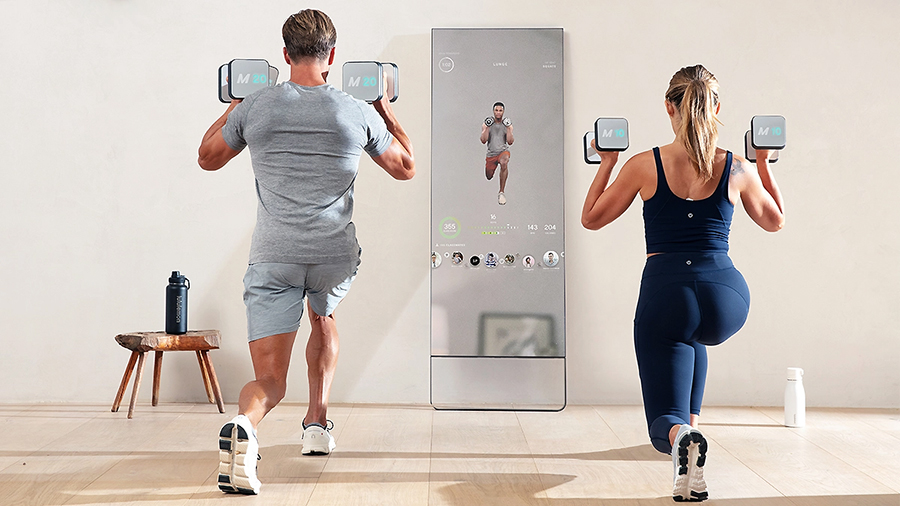Lululemon Athletica, Inc. is working with an adviser to explore selling the Mirror connected fitness business, which has underperformed since LULU acquired the company in 2020, sources told Bloomberg.
The report comes as Lululemon on March 29 said it absorbed after-tax impairment and other charges totaling $442.7 million against fourth-quarter earnings related to Mirror, which offers on-demand workouts and virtual personal training streamed through a video-enabled mirror screen.
The charge came after LULU conducted an impairment test at the end of the fourth quarter, given the weakness in the at-home fitness space. The valuations used in the impairment calculation are based on an evaluation of Mirror as a standalone basis.
The charges cover a shift in the Mirror business away from the hardware-centric business it acquired in 2020 to focus on an app-based model as Mirror sales during the holiday season came in below expectations.
At the time, LULU also said it was updating its loyalty program to make ownership of a Mirror no longer a requirement as part of its paid-membership program, Lululemon Studio. The device costs $995, down from $1,500 when Lululemon acquired Mirror for $500 million in July 2020.
In response to the report Bloomberg received of a potential sale of Mirror, a spokesperson for Lululemon told the company, “We don’t comment on rumors or speculation.” The spokesperson added, “As previously announced, we are shifting the focus of Lululemon Studio from a hardware-centric offering to one that is also focused on digital app-based services going forward. This work is underway, and our strategy will enable us to create long-term value and build a larger community of guests with a deeper connection to Lululemon.”
Soon after acquiring Mirror, Calvin McDonald, Lululemon’s CEO, heralded the acquisition as the centerpiece of the retailer’s “vision to be the experiential brand,” and the platform became the driver of its loyalty efforts; however, McDonald told analysts on the retailer’s fourth-quarter call in late March that the at-home fitness space had been “challenging” since the acquisition, and Mirror’s holiday results missed plan.
McDonald said, “Since our acquisition, the at-home fitness space has been challenging. While members love our content, hardware sales did not match our expectations. And even though our customer acquisition cost (CAC) has continued to improve, it has not improved enough to maintain the current level of investment.”
There were signals that the Mirror business was in trouble in December 2021, when Lululemon significantly reduced its sales guidance for the equipment for 2021, predicting sales in the range of $125 million and $130 million, down from its previous projection of between $250 million and $275 million. The weakness was tied to a broader weakness in the at-home fitness space, marked by Peloton’s challenges.
As part of March’s update, LULU said it would continue providing in-home hardware and content for members who own or want to purchase a Lululemon Studio Mirror. The Studio program will relaunch this summer with studio content available through an app in addition to Mirror devices at a lower monthly subscription cost.
Under the current plan, launched in October 2022, members pay a $39 monthly fee to access Mirror’s streaming workouts. Members also receive apparel discounts, free classes at Lululemon’s “experiential” stores, discount classes at fitness boutique partners, and early access to in-person events.
No changes are planned for the free Essentials tier of Lululemon’s membership program, which continues to experience robust growth in new memberships.
McDonald noted that the Essentials tier enrolled more than 9 million members since its launch last October, better than expected. Perks under the free program, also available to Studio members, include early access to product drops, no-receipt exchanges and select Studio content accessible through the app. “This demonstrates the significant potential behind this program,” said McDonald.
McDonald is confident the “more efficient” paid app-based model can build on the Essentials tier’s success in meeting the company’s broader membership goals of building community, increasing engagement and driving incremental spend.
“We view Lululemon Studio in the same way we view any innovation,” said McDonald at the time. “We test, we learn and we evolve as necessary. Although the acquisition has not fully materialized as originally intended, we’re in a much better position in our understanding of the community and our new membership program as a result.”
Photo courtesy Lululemon
















